Remarkable life of US president Gerald Ford revealed in new biography
Gerald Ford was more than just a stopgap president remembered for pardoning Richard Nixon, renowned historian Richard Norton Smith reveals in a new biography.
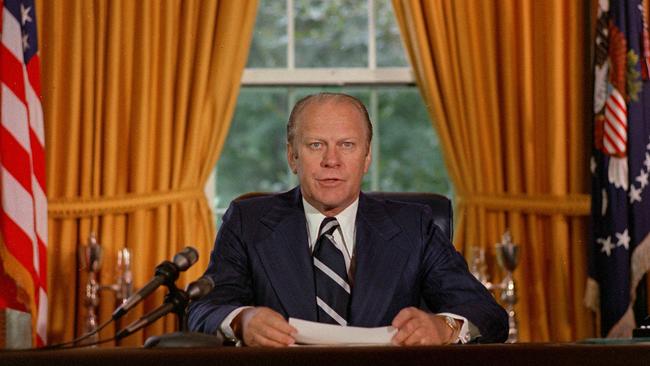
Presidential historian Richard Norton Smith says his new biography of Gerald Ford is the book he was born to write. He knew Ford personally, worked as an intern at the Ford White House, ran his presidential library and museum for six years, and delivered a eulogy at his memorial service.
“I thought long and hard, not so much about whether I could be detached and necessarily critical but whether people would think I could be, which are two different things,” Smith, 69, tells Inquirer in an interview from Grand Rapids, Michigan. “I’ve been doing this, as you know, for a long time and I was confident that I could write about Ford with the necessary detachment to be credible.
“I talked to David McCullough, the great historian, who said, ‘Write what you know.’ And the irony was that I spent 10 years discovering all the things I did not know.”
At more than 800 pages, using previously unavailable archival material and speaking to more than 170 people, and after 10 years of research and writing, Smith has delivered a landmark biography of the 38th US president.
It is a balanced and nuanced account of an extraordinary life with new revelations.
Smith was eager to challenge the stereotype of Ford as a short-term accidental president, sandwiched between the disgraced presidency of Richard Nixon and the restorative presidency of Jimmy Carter, and as somewhat of a dunce, parodied as such by comedian Chevy Chase on Saturday Night Live. He was more than just a stopgap president remembered for pardoning Nixon.
“There is a lot that we did not appreciate at the time,” Smith judges. “Ford went to his grave believing that his historical legacy was basically summed up in his efforts to restore some degree of trust in the presidency, not only after Watergate but Vietnam and a whole tumultuous decade in American life.
“He was much more of an initiator. Economic deregulation started with railroads and the financial sector. The Helsinki Accords he signed in 1975, for which he was severely criticised, was a milestone leading to the collapse of the Soviet Union. US policy in Africa swung 180 degrees from unquestioning support for white minority governments to a commitment to black majority rule.”
Ford was elected to congress from Michigan’s fifth district in 1948, and his stated ambition was to be house Speaker. But he was more ambitious, Smith finds. He wanted to be Nixon’s running mate in 1960. Ford knew about the corruption investigation into vice-president Spiro Agnew long before it was public, and eyed an opportunity to become vice-president. He also knew that John Connally, favoured by Nixon for the post, would struggle to win congressional endorsement. Nixon nominated Ford for vice-president in October 1973.
It was suspected Ford’s pardon of Nixon for the Watergate scandal cover-up was a quid pro quo for accepting the vice-presidency or being elevated to the presidency in August 1974. Nixon’s chief of staff, Alexander Haig, raised the pardon with Ford several times but Ford was careful not to agree before becoming president. Betty Ford told him to reject a deal to pardon Nixon. Nixon accepted a pardon because he feared prosecution, but Smith writes that Leon Jaworski, the special prosecutor, never planned to indict the former president.
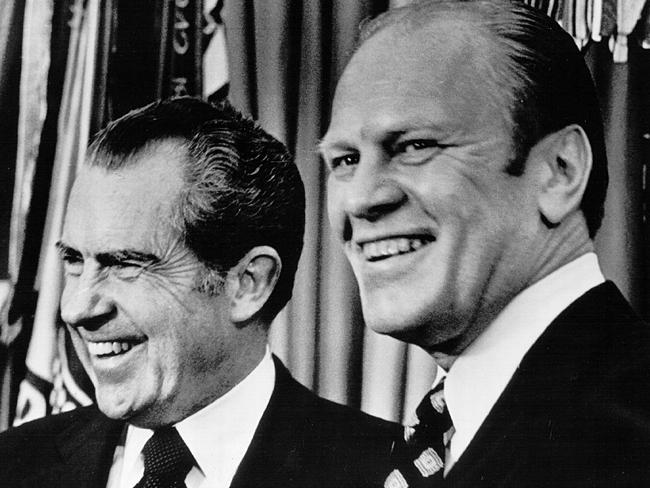
Ford believed Nixon’s acceptance of a pardon, based on legal precedent, meant he accepted wrongdoing. Ford was trying to forget Nixon, not to forgive him, and move on. But most Americans never forgave Ford and his approval ratings tumbled.
The pardon was widely condemned but decades later was praised as courageous, including by leading Democrat Ted Kennedy and crusading Watergate journalists Bob Woodward and Carl Bernstein. But, in light of Donald Trump’s attempted coup d’etat on January 6, 2021, historians now are revisiting that judgment. Smith argues the pardon was justified then and remains so.
“Trump’s behaviour is in a category by itself,” Smith responds. “We elect presidents for a number of reasons, but one of the reasons is their ability and willingness to make tough, perhaps even politically suicidal, decisions. You can pass judgment on Ford or any other president by any standards you want, including contemporary standards.
“But it seems to me that you can only understand Ford, or any other president or any other difficult decision, by immersing yourself in the context of the time … did Ford’s pardon of Nixon in some way open the door to legitimise Trump’s behaviour? Or at least build in the assumption that future presidents could automatically expect to be pardoned if they broke the law? I don’t see the connection.”
Ford’s early life was marked by turmoil and tragedy. He was born Leslie King Jr in Nebraska to Dorothy Gardner and Leslie King in July 1913. King Sr was an abusive husband who, Smith suspects, raped his wife on their honeymoon and threatened to kill her. She fled with their son the same year, marking it as “baby’s first car ride” in a scrapbook, and filed for divorce. King Sr was later jailed for not paying child support. Dorothy later remarried and Ford adopted his stepfather’s name.
Smith’s dogged research reveals new insights into Ford. He was denied an opportunity to become an FBI agent by J. Edgar Hoover, who was concerned about Ford’s pre-World War II involvement in the isolationist America First group. (Ford, with degrees from Michigan and Yale universities, later served in the US Navy during wartime.) As a congressman, Ford suspected the Soviet Union was installing nuclear weapons in Cuba and persuaded the CIA to increase surveillance flights, which led to the Cuban missile crisis in 1962.
A fascinating chapter deals with Ford’s appointment by Lyndon Johnson to the Warren Commission to examine John Kennedy’s assassination. Ford thought there might be a foreign conspiracy. He pursued rumours of CIA involvement and conveyed information to the FBI. He was reluctant to agree to the draft report denying a conspiracy in favour of Lee Harvey Oswald as lone assassin. He emphasised that the commission found no evidence of a conspiracy, not that there was no conspiracy.
When Ford was sworn in as president, he declared: “Our long national nightmare is over.” He sought to stabilise the government, rebuild trust in institutions and ease the national trauma of Watergate. Ford also had inherited an economy with high unemployment and inflation, a losing war in Vietnam and the threat of nuclear conflict with the Soviet Union, eased somewhat by arms-control talks.
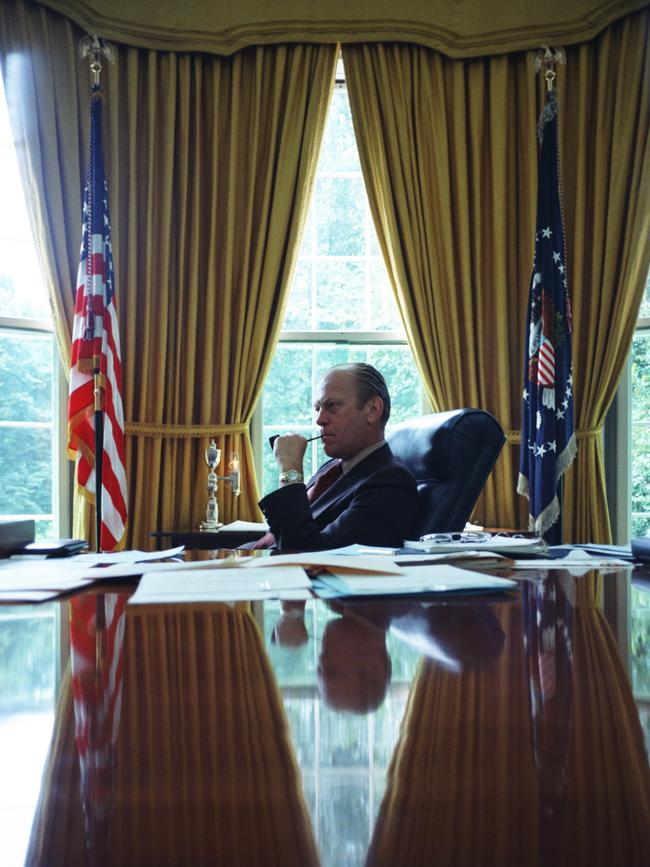
The biography portrays Ford as a post-New Deal president, a bridge between Nixon’s pragmatism and Ronald Reagan’s doctrinaire conservatism, with echoes of Eisenhower Republicanism. He was now an internationalist, backed the Equal Rights Amendment for women and was a longtime supporter of civil rights. He initiated economic reforms to combat inflation and unemployment, and continued detente with China and the Soviet Union.
Ford narrowly lost a bid for re-election to Carter in November 1976, becoming the only president never to be elected as vice-president or president. Smith judges the pardon to be a key factor explaining the defeat, but the sluggish economy was also a reason. Ford later became close friends with Carter, who welcomed his counsel. Ford thought his remarkable wife, Betty, would leave a larger imprint on US national life.
In a bizarre turn of events, Ford was almost Reagan’s running mate in 1980. Reagan asked Ford to join his ticket and discussed an effective co-presidency for months.
It was only at the Republican National Convention in Detroit in July 1980 that they both realised it would not work and George HW Bush was chosen. Smith suspects Ford wanted Bush to be vice-president all along and the prolonged discussions may have been payback for Reagan’s primary challenge in 1976.
In November last year I visited the Gerald R. Ford Presidential Library in Ann Arbor and the Gerald R. Ford Presidential Museum in Grand Rapids. I also stopped by Ford’s boyhood home on Union Avenue in Grand Rapids, where he lived from age eight to 17. Smith has run five presidential libraries and museums, including Ford’s from 1996 to 2001.
Twenty years earlier, in mid-1975, Smith had been an intern in the Ford White House. He criticised the program in an article for The Washington Post, which led to it being scrapped. He later got to know Ford as an ex-president and they collaborated on speeches and articles, including one defending Bill Clinton who was facing impeachment for his relationship with Monica Lewinsky. Ford told Republicans to censure rather than impeach Clinton.
“In an act of postgraduate smart-arsery, I wrote that article exposing the intern program which was a very minor scandal,” Smith recalls. “In any other White House, that article would mean you were persona non grata. And it tells you something about Ford – his refusal to hold grudges. We never discussed it. The irony is, I end up running his library and even after I left we stayed in touch.”
In writing biographies of Ford, George Washington and Herbert Hoover, and those who wanted to be president – Tom Dewey and Nelson Rockefeller – Smith strives for “scholarly rigour with popular accessibility”. He brings history to the masses. His book Patriarch: George Washington and the New American Nation (1993) is widely regarded as one of the best biographies of the revolutionary general and first US president.
“Most of the people I have written about have been overlooked or a caricature,” Smith notes. “The challenge is to find an angle that is new and revealing. I thought the way to humanise Washington was to live with him for the last 10 years of his life. He was an extraordinarily gifted natural politician, but he went to his grave insisting he was not a politician at all.”
The ironically titled An Ordinary Man is a reminder of a different political age, when character and integrity mattered, and the Republican Party had a moral compass. In the years before Ford’s death in December 2006, Smith says, the former president was “a man without a party” and politically “marooned” as he supported same sex-marriage, affirmative action and a woman’s right to choose.
Ford thought restoring honesty to the White House would be his legacy. He identified with Harry Truman, another plain-spoken midwesterner who had succeeded a controversial vice-president and was then elevated to the presidency. Ford replaced Nixon’s portraits of Theodore Roosevelt and Woodrow Wilson with Abraham Lincoln and Truman in the Cabinet Room.
“Ford was a very unconventional president,” Smith says. “He was not a television president. He was charismatically challenged. He was not a great orator. He had a lot in common with Harry Truman who, like Ford, didn’t really come to be appreciated until several decades after his death.”
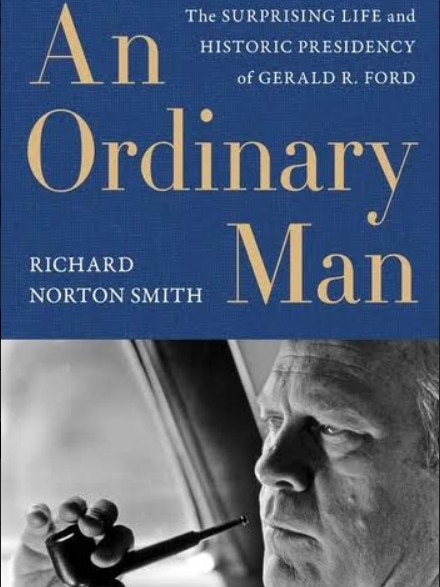
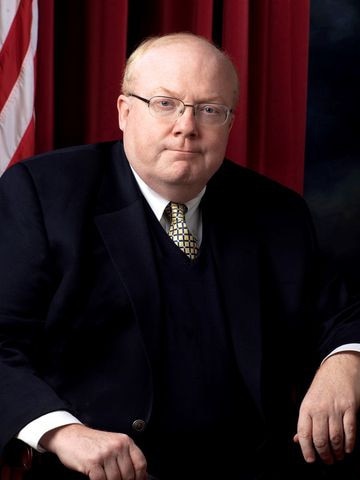
An Ordinary Man: The Surprising Life and Historic Presidency of Gerald R. Ford by Richard Norton Smith is published by HarperCollins.


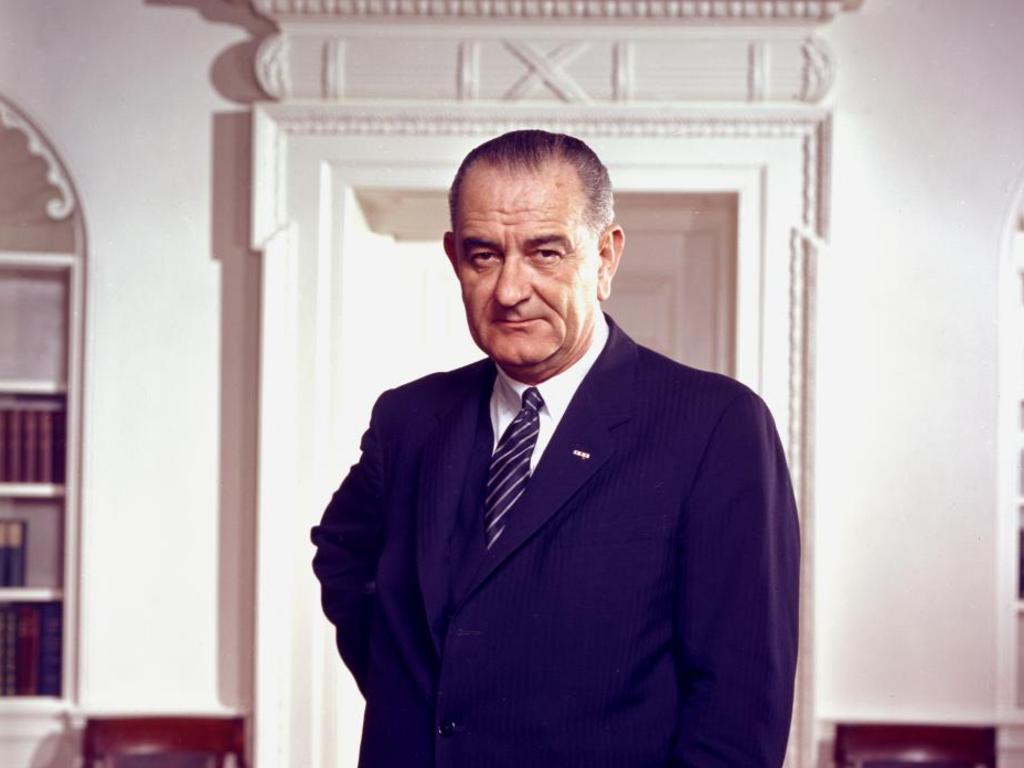
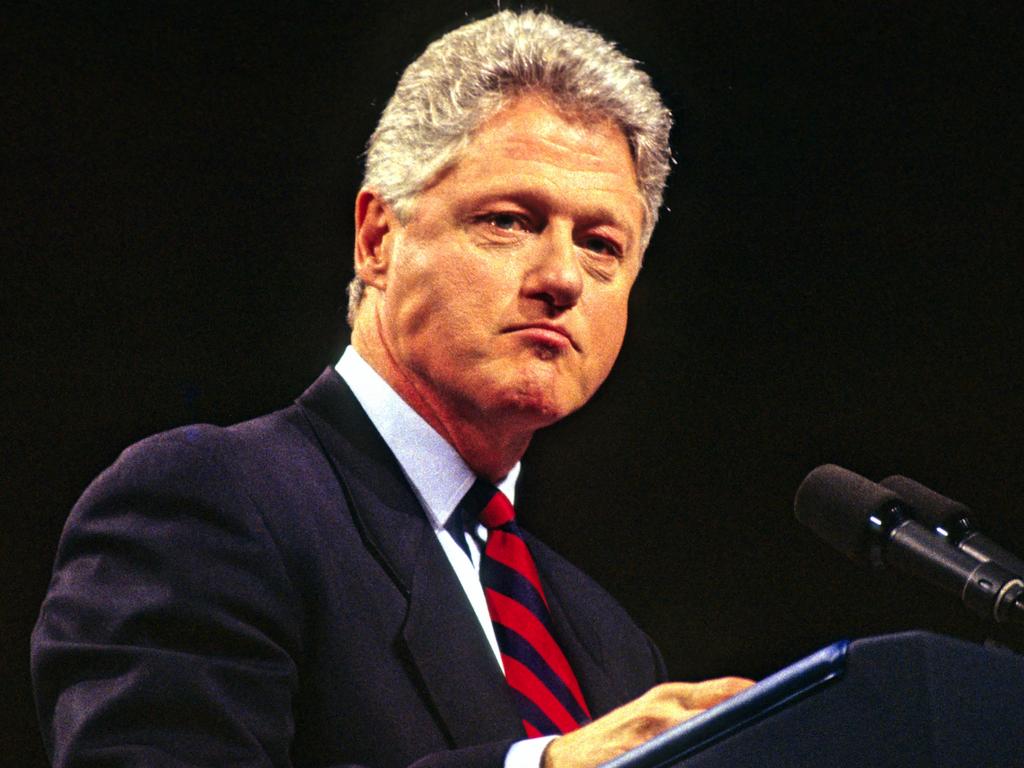
To join the conversation, please log in. Don't have an account? Register
Join the conversation, you are commenting as Logout